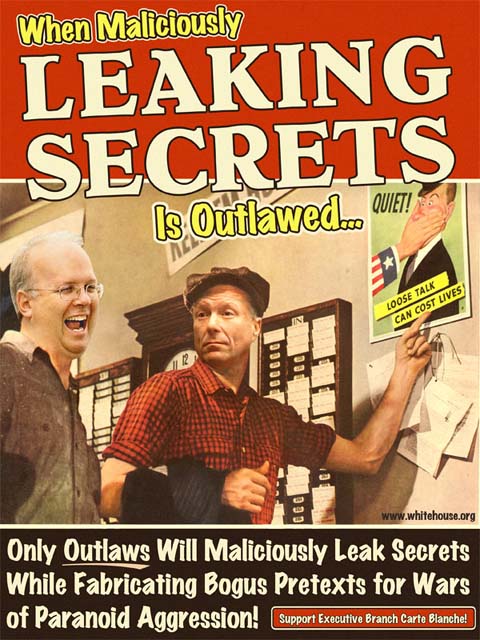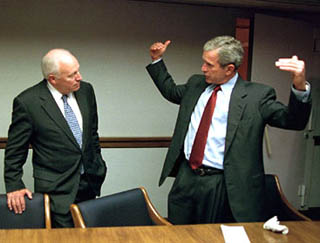|
Will Matthews Corroborate Russert?
by Michael Smerconish on 5 November 2005 in HuffingtonPost.com
For those willing
to invest the 15 minutes it takes to digest the 22-page indictment
of I. Scooter Libby, the simplicity of the charges will become clear,
despite the crossfire of the pundits wearing their usual jerseys.
In a nutshell, here is what is alleged: The feds believe that Scooter
Libby lied to them on four separate occasions as they sought to investigate
whether a CIA agent, who might have been covert, was unlawfully “outed”
as a form of political retribution.One subject of Libby’s lies,
according to the feds, was a telephone call that occurred on July
10, 2003 between Libby and Tim Russert, the NBC bureau chief. Libby’s
story, according to the indictment, is that Russert raised Joe Wilson’s
name in that call, and that Russert asked Libby if he knew that Wilson’s
wife works for the CIA. Russert’s story is completely different.
According to him, he did not ask Libby if Libby knew about Wilson’s
wife, in fact, the call itself had nothing to do with Joe Wilson.
To the contrary, according to Russert, Libby was calling to complain
about coverage on MSNBC, a reference, it is widely presumed, to Chris
Matthews’ criticism of the Administration policy in Iraq. Indeed,
in the days just before this call between Libby and Russert, Matthews
had been particularly vocal. The feds believe Russert, not Libby.
Watching from here, in the bleachers in Matthews’ hometown of
Philadelphia, my instincts tell me that if Russert received a complaint
call about Matthews from the Vice President’s Chief of Staff,
Russert’s next call would probably have been to Matthews himself
to tell him what Libby had just said. (At least that’s the way
it always worked in the schoolyard – you know, ‘guess
what so-and-so just said about you’.)
So, did Russert make such a call to Matthews after hanging up with
Libby? I got the chance to ask that question of Chris Matthews today.
His reply: “No, I never got such a call.”
I’m glad I did not leave it there. I immediately worried that
my question had been too restrictive with regard to timing, so I then
asked whether he “ever” had any conversation with Russert
where Russert told him that Libby had a beef with him (Matthews)?
What I was really asking was whether Matthews could corroborate Russert’s
side of the conversation.
This time he hedged a bit. Here is my literal transcription of what
Chris Matthews told me.
“Well, let me just tell you this, without getting into that,
because I know the answer generally to your question, is that, because
all of this involves testimony that Russert is probably going to have
to make, and let me just tell you this, that those people in the White
House, especially Libby and the Vice President, working as a team,
‘connected as a root’ to use Libby’s favorite phrase,
basically pulled off an Alleyoop play to get us into war in Iraq,
by feeding to the New York Times stories about nuclear potential in
the hands of Saddam Hussein, to get it into the Sunday paper, and
then deploying the Vice President on Meet the Press and other Administration
officials like Condi Rice on the other Sunday talk shows in a kinda
Alleyoop play. So they put the ball in the air, and then on Sunday
mornings, these guys put it in the basket, and then all of a sudden
we’re at war over Iraq because a lot of Americans in the middle
politically say ‘I don’t know how we’re getting
into that mess or why we’re getting in it, but I guess we have
to protect ourselves against a mushroom cloud’, that is Condi’s
phrase.
So having pulled this masterful move of moving the undecided middle
into the war, they then became very sensitive to the charge by Joseph
Wilson that they had done the very thing, pushed the nuclear button
and then covered up any threat to that nuclear button, and Wilson
was that threat, and then, going volcanic against anybody including
me, who dared to say ‘Wait a minute, there is a pattern here
of how we got into the war, and how they promoted the nuclear case
and how they protected the nuclear case against Wilson’.
They didn’t like me doing that, I know that a number of Administration
officials were screaming at my network at all levels about me raising
this issue, the very points I’ve just made. They don’t
like hearing it, Libby is in trouble now because he doesn’t
like hearing it, the Vice President is very much a part of this, and
the answer to your question is that you are on the right trail, Michael.”
What does all of that mean? To me, at least, that Russert may not
have called Matthews immediately after hanging up the phone with Scooter
Libby, but he did tell his colleague of that call which does not bode
well for Libby. |


